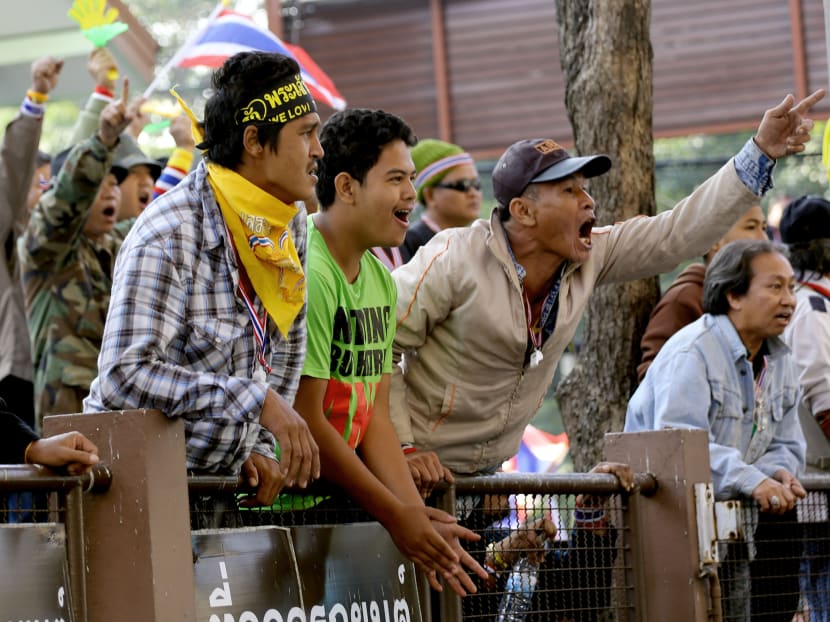Yingluck proposes reform body
BANGKOK — Thailand’s caretaker Prime Minister Yingluck Shinawatra yesterday proposed a council to consider political reforms as she tried to quash huge protests in the capital demanding her resignation and the suspension of an election she has called for February.

Anti-government protesters chant slogans while blocking a police station near a sports stadium to prevent political parties from making a registration in the upcoming general election in Bangkok, Thailand, Monday, Dec. 23, 2013. Photo: AP
BANGKOK — Thailand’s caretaker Prime Minister Yingluck Shinawatra yesterday proposed a council to consider political reforms as she tried to quash huge protests in the capital demanding her resignation and the suspension of an election she has called for February.
The proposal, which comes after weeks of anti-government protests that have rallied more than 200,000 people at their peak, could be put into play soon and would be free of government interference, Ms Yingluck said in a televised address.
“We have considered and concluded a process can take place without disrupting the next election on Feb 2,” she said. “I completely agree it is now time to come up with a new mechanism to really reform Thailand.”
Ms Yingluck had called the snap election in a bid to deflate the protests, but her compromise offer was immediately rejected by the protesters, who draw strength from Bangkok’s middle class and elite and who dismiss her as a puppet of her self-exiled brother and former Premier Thaksin Shinawatra.
The new plan calls for a council of 499 eminent Thais, chosen by a wider group of 2,000 people, to examine reform of Thailand’s political system. It looks similar to the unelected “people’s council” protest leader Suthep Thaugsuban has proposed to replace the government, with one crucial difference: Under the proposal, the reform council would operate alongside an elected government, not an appointed one.
“I insist that the new elected government will take this and implement what the council decides on how to reform the nation,” Ms Yingluck said.
Mr Tavorn Seniem, a protest leader, dismissed the proposal and said there are no guarantees the government will listen to the council’s recommendations.
“This council would work for the benefit of the government’s side, not for all Thai people,” he said.
A lawmaker from the main opposition Democrat party, which has backed the protests, called the plan unacceptable. Mr Thavorn Senneam, who resigned his parliamentary seat to join the protests, said: “I believe this is just to buy time to proceed with the election on Feb 2. Real change isn’t going to happen.”
The demonstrators still want to derail the election because they know Thaksin’s populist political juggernaut is almost certain to win the vote, as it has at every ballot since 2001.
Thaksin and Ms Yingluck’s power base lies among the vote-rich rural north and north-east due to policies such as cheap healthcare, easy credit and price guarantees for farmers. But their opponents accuse him of manipulating the rural poor in those areas to entrench his power.
Thaksin, a telecoms billionaire, was overthrown in a 2006 coup. He has lived in self-exile since 2008, when he was sentenced to a two-year jail term for graft, a conviction he calls politically motivated.
Ms Yingluck has been meeting rural supporters over the past week and plans to stay in the north until the New Year. She has refused to postpone the poll, which the Democrats have declared they will boycott.
Protesters yesterday attempted to disrupt the registration of election candidates at a sports stadium in central Bangkok, leading to isolated scuffles with the police. Ms Yingluck’s Cabinet yesterday extended security laws expiring on Dec 31 that allow the authorities to block roads and search vehicles, among other powers. The laws will expire on March 1.
Thaksin’s opponents tolerated Ms Yingluck’s government over its first two years, but the protests were triggered when the ruling Puea Thai party attempted to pass an amnesty law that would have enabled Thaksin to return to Thailand without serving any prison time for the corruption conviction. AGENCIES






